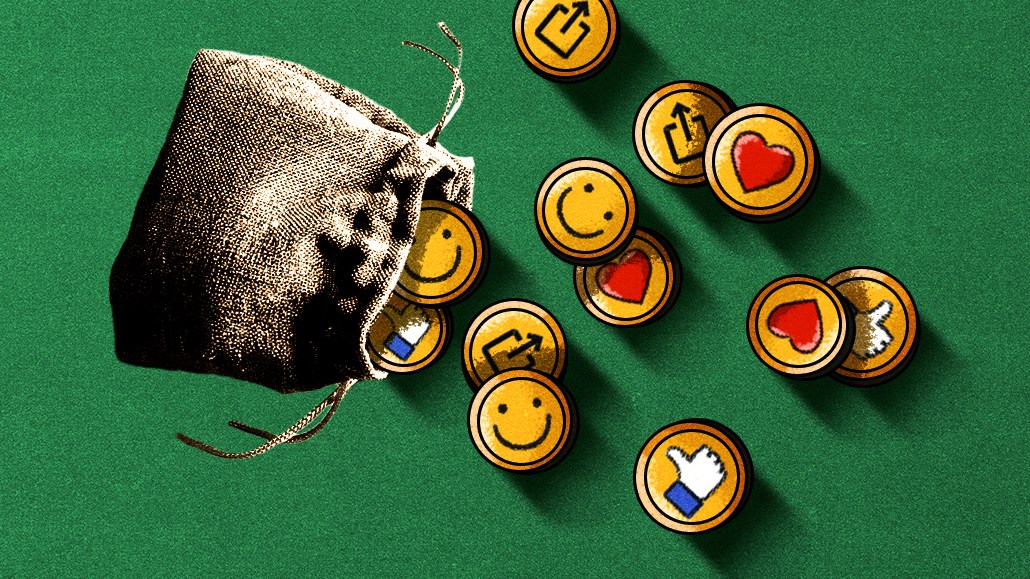By Kimeko McCoy • November 8, 2024 •

Ivy Liu
Brands used to carefully curate their social media pages, presenting overly polished content and professionalism.
That was then. Now, that pendulum has swung to the other side, with brands like Duolingo, Dunkin’, Scrub Daddy and Nutter Butter seemingly embracing chaos, adopting Gen Z’s extremely online culture and internet speak as the new standard approach to social.
Mondelez’s Nutter Butter in particular has made headlines as of late for its social posts made up of cryptic tweets and peanut butter-covered haunted house videos. The New York Times called Nutter Butter’s approach a “fever dream” while social media users have spent the past few weeks trying to figure out what to make of the cookie brand’s online presence. (The snack brand responded to one user asking if Nutter Butter was OK.)
The approach has gotten people talking and grown the account to more than a million followers at this point — even if they’re questioning the strategy. Nutter Butter, however, isn’t worried about turning shopper’s off or alienating other generations by tapping into social media subcultures, said Tony Wood, vp and head of social marketing and strategy at Dentsu Creative. The creative agency started working with Nutter Butter back in 2021, employing its cryptic strategy for the past year. It’s only now that the posts have gone viral, picked up by news outlets and the general public.
“The bar for what is ‘normal’ among social media is changing,” he told Digiday. Wood added, “I’m not saying mainstream culture is dead, but I think that brands can benefit by realizing that subcultures are not as niche as they may think.”
Brands building their online personas around internet culture, and in some cases, Gen Z speak, isn’t a new phenomenon. Brands’ so-called “unhinged” approach to social media has been trending for the last few years. There were Wendy’s viral clap backs around 2017. Then came now-defunct Radio Shack NSFW tweets in 2022. Last month, Dunkin went viral for its own unconventional (and also maybe NSFW) social campaign, featuring its Halloween-themed spider donut. If you want to take the unhinged concept back even further, recall the Quiznos singing rodents (known as spongmonkeys) that wore bowler hats. They made a return last year.
Legacy brands, like Dunkin’ and Nutter Butter, are tasked with marketing to the next generations of shoppers, Gen Z and Gen Alpha. It makes sense to deploy a social content strategy that’ll make younger users stop their endless scrolling and engage with those brands, according to Holly Willis, founder and CEO of Magic Camp, creative agency and marketing consultancy.
“They’re reinforcing that brand’s humanity and that willingness to experiment and try new things,” she said, “and to be silly and not so serious, which is really attractive to Gen Alphas and younger Gen Zers.”
In fact, Dentsu Creative was not tasked with considering millennials in building out the current interaction of its social media footprint, according to Ryan Benson, creative director at Loud Mouth, creative advocacy agency. Benson formerly served as manager of social marketing and strategy at Dentsu Creative from June of 2022 through September of 2023, according to his LinkedIn. He helped build out Nutter Butter’s Gen Z-focused, absurdist social media strategy. That was mostly because the cookie brand had already found its footing with millennials and was aiming to get in front of younger shoppers, he added.
To Willis’ point, the unhinged (or as Wood puts it, “anti-bland”) social strategy is unlikely to alienate shoppers from other generations, said Liz Cole, chief social officer at VML agency. Even in light of critique from other social media users, she added, the worry is “overblown in a lot of cases.”
She continued, “When you take into account too strongly the risk of alienating a core audience, you’re making a lot of assumptions about what they’re paying attention to, and whether or not their loyalty to a brand is shakable.”
In other words, a brand’s quirky social media presence is unlikely to be enough to be the determining factor as to whether or not a consumer will either opt for a competing brand or stop buying a product they’ve regularly purchased, she added.
Now, if a quirky or so-called unhinged social media presence is sustainable, is another question, especially considering how quickly internet culture moves. Trends change day to day and hour by hour in today’s social media landscape.
As more brands follow in the footsteps of brands like Nutter Butter, Duolingo, Scrub Daddy and others, it can be hard for them to differentiate themselves from one another. “Eventually, everything just sort of congeals into what we think of as the generic internet voice at the moment, and it becomes hard to get credit for it,” said Cole.
Wood acknowledges that public attention can be fleeting, but points to research and data to prove the effectiveness of Nutter Butter’s “anti-bland” online presence. (Wood declined to outline specific data points.)
“We show proof through social listening to demonstrate how the real world is talking, how they’re engaging on social. That determines where the bar is for people,” he said.
https://digiday.com/?p=560097
